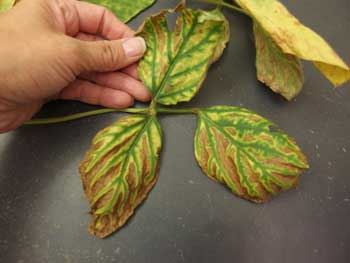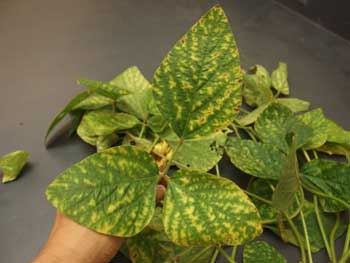SDS Appears In Missouri Soybean Fields
COLUMBIA, MO.
Sudden death syndrome (SDS) is showing up in soybean fields across the state. Farmers should scout fields thoroughly for symptoms of SDS.
SDS, caused by the soil fungus Fusarium virguliforme, produces striking foliage symptoms, which first appear on upper leaves as scattered yellow blotches that increase in size, says University of Missouri Extension plant pathologist Laura Sweets. Yellow areas may turn brown, but veins remain green. As the disease advances, leaves turn brown and may curl up or fall off the plant.
Root systems deteriorate and lateral roots and taproots may be discolored. When split open, internal tissues of the taproot and lower stem may be light gray to light brown. Infected plants may have smaller root systems and clumps of dusty blue mold growth may be visible on the taproot.
Several diseases may look alike, so you have to get into the field, Sweets says.

Foliage symptoms of sudden death syndrome in soybean.
Credit: MU Plant Diagnostic Clinic

SDS appears in fields with high soil moisture. This year, a wet, cool spring followed by the second-coolest July on record created conditions favorable for SDS in much of Missouri.
High numbers of early season soybean root rot due to weather conditions may have been a precursor to SDS, said MU Plant Diagnostic Clinic director Patricia Wallace. “SDS is a big problem this year,” she said.
The disease sometimes appears as a circular or oval area of yellow or dying plants in fields. It may appear in irregular or wavy streaks that follow drainage patterns in the field.
Little can be done once plants are infected. Weather over the rest of this growing season influences the severity of loss.
Sweets encourages producers to note where SDS was found this year. Preventative management, including selecting resistant varieties, staggering planting dates, rotating crops and minimizing soil compaction, may help prevent the disease next growing season.
Producers with dying plants are encouraged to submit plants through their county extension center or to the MU Plant Diagnostic Clinic. Call 573-882-3019 for more information. ∆